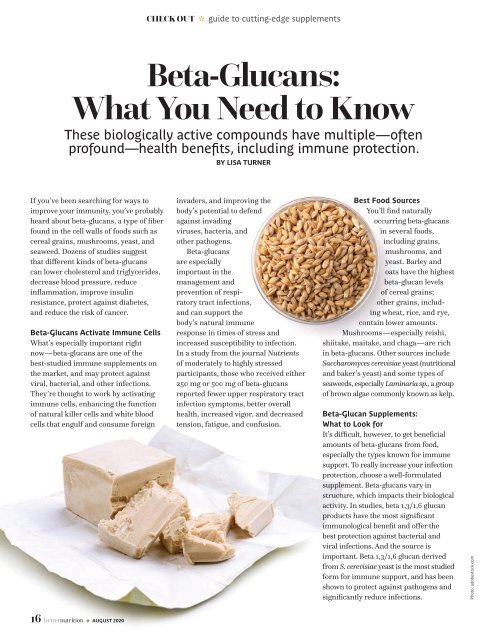Create successful ePaper yourself
Turn your PDF publications into a flip-book with our unique Google optimized e-Paper software.
CHECK OUT *<br />
If you’ve been searching for ways to<br />
improve your immunity, you’ve probably<br />
heard about beta-glucans, a type of fiber<br />
found in the cell walls of foods such as<br />
cereal grains, mushrooms, yeast, and<br />
seaweed. Dozens of studies suggest<br />
that different kinds of beta-glucans<br />
can lower cholesterol and triglycerides,<br />
decrease blood pressure, reduce<br />
inflammation, improve insulin<br />
resistance, protect against diabetes,<br />
and reduce the risk of cancer.<br />
Beta-Glucans Activate Immune Cells<br />
What’s especially important right<br />
now—beta-glucans are one of the<br />
best-studied immune supplements on<br />
the market, and may protect against<br />
viral, bacterial, and other infections.<br />
They’re thought to work by activating<br />
immune cells, enhancing the function<br />
of natural killer cells and white blood<br />
cells that engulf and consume foreign<br />
16 • AUGUST <strong>2020</strong><br />
guide to cutting-edge supplements<br />
Beta-Glucans:<br />
What You Need to Know<br />
These biologically active compounds have multiple—often<br />
profound—health benefits, including immune protection.<br />
BY LISA TURNER<br />
invaders, and improving the<br />
body’s potential to defend<br />
against invading<br />
viruses, bacteria, and<br />
other pathogens.<br />
Beta-glucans<br />
are especially<br />
important in the<br />
management and<br />
prevention of respiratory<br />
tract infections,<br />
and can support the<br />
body’s natural immune<br />
response in times of stress and<br />
increased susceptibility to infection.<br />
In a study from the journal Nutrients<br />
of moderately to highly stressed<br />
participants, those who received either<br />
250 mg or 500 mg of beta-glucans<br />
reported fewer upper respiratory tract<br />
infection symptoms, better overall<br />
health, increased vigor, and decreased<br />
tension, fatigue, and confusion.<br />
Best Food Sources<br />
You’ll find naturally<br />
occurring beta-glucans<br />
in several foods,<br />
including grains,<br />
mushrooms, and<br />
yeast. Barley and<br />
oats have the highest<br />
beta-glucan levels<br />
of cereal grains;<br />
other grains, including<br />
wheat, rice, and rye,<br />
contain lower amounts.<br />
Mushrooms—especially reishi,<br />
shiitake, maitake, and chaga—are rich<br />
in beta-glucans. Other sources include<br />
Saccharomyces cerevisiae yeast (nutritional<br />
and baker’s yeast) and some types of<br />
seaweeds, especially Laminaria sp., a group<br />
of brown algae commonly known as kelp.<br />
Beta-Glucan Supplements:<br />
What to Look for<br />
It’s difficult, however, to get beneficial<br />
amounts of beta-glucans from food,<br />
especially the types known for immune<br />
support. To really increase your infection<br />
protection, choose a well-formulated<br />
supplement. Beta-glucans vary in<br />
structure, which impacts their biological<br />
activity. In studies, beta 1,3/1,6 glucan<br />
products have the most significant<br />
immunological benefit and offer the<br />
best protection against bacterial and<br />
viral infections. And the source is<br />
important. Beta 1,3/1,6 glucan derived<br />
from S. cerevisiae yeast is the most studied<br />
form for immune support, and has been<br />
shown to protect against pathogens and<br />
significantly reduce infections.<br />
Photo: adobestock.com

















